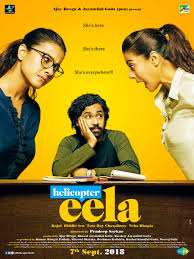Balancing parenting and pursuing personal dreams takes center stage in this film, a family drama with a dose of comedy. Starring Kajol in the titular role, the story is set in contemporary Mumbai, and it falls into the family-drama genre, exploring themes of motherhood, self-identity, and the evolving relationship between parents and children in a modern, fast-paced world. Directed by Pradeep Sarkar, this movie attempts to strike a balance between heartfelt emotions and light-hearted moments, all while delving into the lives of its characters.
The story follows Ela, a single mother who gave up her dreams of becoming a singer to raise her son, Vivaan. As Vivaan grows older, the dynamics between the mother and son begin to shift. Ela, feeling a sense of void in her life as her son becomes more independent, decides to join his college to complete her education. While this decision brings humor and awkwardness into their lives, it also sets the stage for some serious conversations about personal aspirations, boundaries, and the mother-son bond. The story delicately explores how their relationship evolves through this transition, touching on themes of independence, self-discovery, and the sacrifices parents make for their children. It’s a journey of rediscovery for Ela, who has to find her own identity beyond being just a mother, while Vivaan learns to navigate his growing sense of independence.
Kajol, as Ela, dominates the film with her charismatic and lively performance. She brings her character to life with a blend of humor, emotional vulnerability, and over-the-top motherly affection. Kajol effortlessly switches between comedic moments, where she hilariously oversteps boundaries in Vivaan’s life, to deeply emotional scenes that explore her loneliness and struggles as a single mother. A standout scene is when Ela, after years of focusing solely on her son, finally confronts her forgotten dreams, allowing Kajol to showcase her range and connect with the audience on an emotional level. She carries the weight of the film, and her portrayal of Ela’s protective yet overbearing nature feels authentic, even if it veers into melodrama at times.
Riddhi Sen, who plays Vivaan, complements Kajol’s performance well. His portrayal of a young man trying to carve out his own space while feeling suffocated by his mother’s constant presence is relatable. He handles the role with a subtle charm, and their chemistry is natural, especially during the more serious moments when Vivaan is caught between love for his mother and the need for independence. Their dynamic forms the heart of the film, and the evolution of their relationship feels genuine, even if the plot takes predictable turns.
The direction by Pradeep Sarkar is steady but doesn’t push boundaries. He focuses on the emotional core of the film, allowing the relationship between Ela and Vivaan to take center stage. However, the pacing tends to slow down in the middle, and the narrative sometimes feels repetitive as it constantly circles back to the same conflicts. While the film’s light moments provide comic relief, they occasionally feel forced, taking away from the emotional depth. Sarkar’s strength lies in creating moments of genuine warmth and familial connection, but the overall direction could have benefited from tighter editing and a clearer focus on the central themes.
The music, composed by Amit Trivedi, is one of the film’s highlights. The songs fit well into the narrative, particularly the tracks that emphasize Ela’s passion for music and her rediscovery of it. The background score is subtle and does not overpower the emotional scenes, but the songs manage to stand out, adding a layer of sentimentality to the film. Music, in this story, becomes a symbol of dreams deferred and then reclaimed, tying Ela’s personal journey together. While not all tracks are memorable, they complement the narrative, and Kajol’s moments of singing add an extra charm to her character.
Visually, the film is straightforward, with cinematographer Sirsha Ray capturing Mumbai’s urban landscape without much fanfare. The college setting, with its youthful energy, contrasts nicely with Ela’s more mature, settled life at home. The cinematography keeps things simple, letting the story and characters shine without the need for extravagant visuals or special effects. However, the lack of visual flair can sometimes make the film feel flat, especially in scenes that could have benefited from more dynamic camera work or creative angles. The simplicity works for the tone of the film, but a little more visual inventiveness could have added to the storytelling.
The costume design deserves a mention, as it effectively reflects the characters’ personalities. Ela’s wardrobe, filled with vibrant, traditional outfits, highlights her larger-than-life, yet traditional personality, while Vivaan’s more casual, modern clothing represents his youthful rebellion and desire for freedom. These visual cues subtly enhance the narrative, helping to establish the characters without the need for heavy exposition.
Overall, the movie offers a heartwarming story about the sacrifices and joys of motherhood, paired with the universal struggle of finding one’s identity. While the film leans heavily on melodrama, Kajol’s performance keeps the emotional core intact, making it an enjoyable watch for those who appreciate family-centric stories. The film’s message, though predictable, is sincere: the importance of pursuing one’s dreams without losing sight of personal relationships. For viewers who enjoy emotional family dramas with a touch of humor, this movie is a decent pick, especially for fans of Kajol’s trademark charm and wit.
Though not groundbreaking in its narrative, the film succeeds in tugging at the heartstrings, even if the execution feels uneven at times. It’s a reminder that while parents may sacrifice a lot for their children, there comes a time when they need to rediscover their own lives and passions. This balance between family and self is at the heart of the film, making it a relatable, if not entirely fresh, cinematic experience.







